‘Peace Treaty’ Reached on Menomonee Valley Building
Kendall Breunig will get zoning change to redevelop Cream City brick structure.
“It is kind of an ugly property, and I guess I have a history of buying ugly properties,” said Kendall Breunig Tuesday to the Zoning, Neighborhoods & Development Committee.
He was talking about a four-story building in the Menomonee Valley that’s been vacant for 40 years.
Breunig wants to redevelop it, but has encountered resistance from the Department of City Development (DCD) and Menomonee Valley Partners (MVP). He wants to put housing in, while DCD and the Menomonee Valley business improvement district want it preserved for industrial use to avoid conflicts with other nearby businesses.
The dispute over the zoning change resulted in Breunig successfully securing historic designation for the Cream City brick building, a strategy designed to bolster his case.
Breunig also pursued commercial and industrial tenants, at the opposition’s request, but said he was unable to find any that could support the cost of retrofitting the building. Despite its industrial history, the building does not have the structural capacity to support modern industrial or office tenants. Breunig attributes that to joist removal and replacement undertaken after a fire a few decades ago.
A truce was reached to identify the property, 324 N. 15th St., as worthy of a unique exception to allow housing.
Area Alderman Robert Bauman, a supporter of Breunig’s vision, called the compromise a “peace treaty.”
“I think we have reached a point of peaceful resolution,” he added, “and that’s a positive thing.”
“It is complicated. It is a policy decision, but it has a lot of long-term implications as well,” said MVP Executive Director Corey Zetts. “We acknowledge this building is unique in the Valley… Kendall is the only chance we have to have this building saved.”
It’s a position shared by DCD.
“We do believe, as a department, that he’s one of the few people that can pull that off,” said city planning manager Sam Leichtling of Breunig’s capacity. Breunig’s firm, Sunset Investors, has redeveloped several industrial properties, including the Pritzlaff Building.
The zoning change, endorsed by the committee Tuesday, would apply only to Breunig’s property and an update to the Menomonee Valley area plan would identify the property as an exception.
“We found a way to have something we can all agree to,” said Zetts.
Breunig has pursued redevelopment since 2017. He has a purchase option that expires at the end of the year, forcing the issue.
“It is an ugly building, but it has a lot of good character left to it yet,” said Breunig. Approximately 90% of the 300 windows have been broken.
He told the committee that he’s done his environmental and structural due diligence.
“What everyone sees is the blight. The blight is the easy part of this project. The difficult part is the pollution,” he said.
Building History
The 24,000-square-foot structure, completed in 1890, is the final building of the manufacturing complex built by the Geuder, Paeschke & Frey (GPF) company. Milwaukee produced one-third of the tinware in the United States by the 1890s, and GPF was the largest supplier. By the 1930s, GPF was one of the largest manufacturers in the city and the largest producer of kitchen utensils in the U.S.
GPF filed for Chapter 11 bankruptcy in 1983 and was acquired by General Press and Fabricating Company in 1984, when its Menomonee Valley plant shuttered.
The property is currently owned by an affiliate of the Read family, an old-money Milwaukee family that had a role in starting many Milwaukee companies and, more recently, sustaining several nonprofit institutions.
“This property owner has really been derelict in their duty,” said Zetts of the sustained poor condition.
Breunig commissioned environmental and structural studies to understand what remediation would be needed.
“I finally decided the only way I could get this done is to spend the money and take the risk,” he said.
He then ticked off a list of environmental maladies, including heavy metals, but said the contamination not as bad as the chemicals found in a tannery. The Wisconsin Department of Natural Resources would need to provide a remediation plan.
Financial Challenges and Apartment Plans
“This is not an easy project and I’m taking a really big risk,” said Breunig.
The developer said he would finance the development with his own cash. “No bank will touch this thing,” he said.
The upper floors would have apartments with an average size of 800 square feet. They would be leased for $1,200 to $1,500 per month.
“If you looked at the numbers, they would be called workforce housing,” said Breunig. “Most are going to be one bedrooms.”
A portion of the first floor is intended for commercial use. “It will make a great restaurant or commercial space,” said Breunig, citing the high ceiling.
A neighboring lot, 1357-1439 W. St. Paul Ave., would also be developed.
A parking structure would be built on the lot. “In front of that parking garage would be a 6,000 or 8,000-square-foot commercial building,” he said. “And I do have an interested user for that space.”
The zoning change text references an “animal boarding facility.” A nearby business, Central Bark, is required to relocate because of the Interstate 94 expansion project, but Breunig did not identify the tenant.
Council Concerns, Community Support
Alderwoman JoCasta Zamarripa, who represents a portion of the Menomonee Valley, said she continues to be opposed to the development. She cited issues with the Paper Box Lofts development in her district. “I really struggle with doing these kind of things in what has historically been an industrial area of our city.”
“I was a no on this file at first. I think I was using the phrase ‘industrial gentrification,'” said Ald. DiAndre Jackson. But he praised Breunig for being sensitive with the plan. “I don’t want to be in the way of progress.”
“The highest and best use is what Mr. Breunig has brought forward,” said real estate broker Jim Barry of The Barry Company. Given that the property has been listed for two decades, it does not have a future as an industrial property, he noted. “You can see this property from the freeway, and it looks awful.”
Brass Light Gallery owner Steve Kaniewski and Zimmerman Architectural Studios CEO Steve Raasch, both of whom operate nearby businesses, spoke in favor of Breunig’s plans.
The committee, with Council President José G. Pérez serving as chair in place of the late Alderman Jonathan Brostoff, voted 4-1 to support the zoning change and area plan amendment. Zamarripa was the lone no vote.
The full council will consider the proposal at its Nov. 26 meeting
In March, the City Plan Commission, on a 3-2-1 vote, endorsed the zoning change.
Federal Grant On Unrelated Project Will Aid Redevelopment
The Muskego Yard Bypass project, which recently received a $72.8 million federal grant, will benefit Breunig’s development by routing freight trains through the Canadian Pacific Kansas City railyard and away from the tracks that run along the south side of the building.
The same tracks, which serve the Milwaukee Intermodal Station, also run along Breunig’s Pritzlaff Building mixed-use development. “In six years, I’ve had two complaints. People adapt to it,” said the developer.
Breunig will provide tenants a notice of the industrial conditions near the building. Bauman suggested such a provision be included for several buildings, including the new Evoni Apartments near Henry Maier Festival Park.
Photos
Legislation Link - Urban Milwaukee members see direct links to legislation mentioned in this article. Join today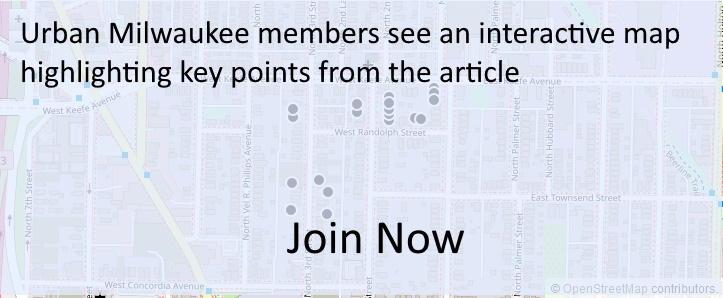
Existing members must be signed in to see the interactive map. Sign in.
If you think stories like this are important, become a member of Urban Milwaukee and help support real, independent journalism. Plus you get some cool added benefits.
Political Contributions Tracker
Displaying political contributions between people mentioned in this story. Learn more.
- September 12, 2014 - Robert Bauman received $386 from Kendall Breunig


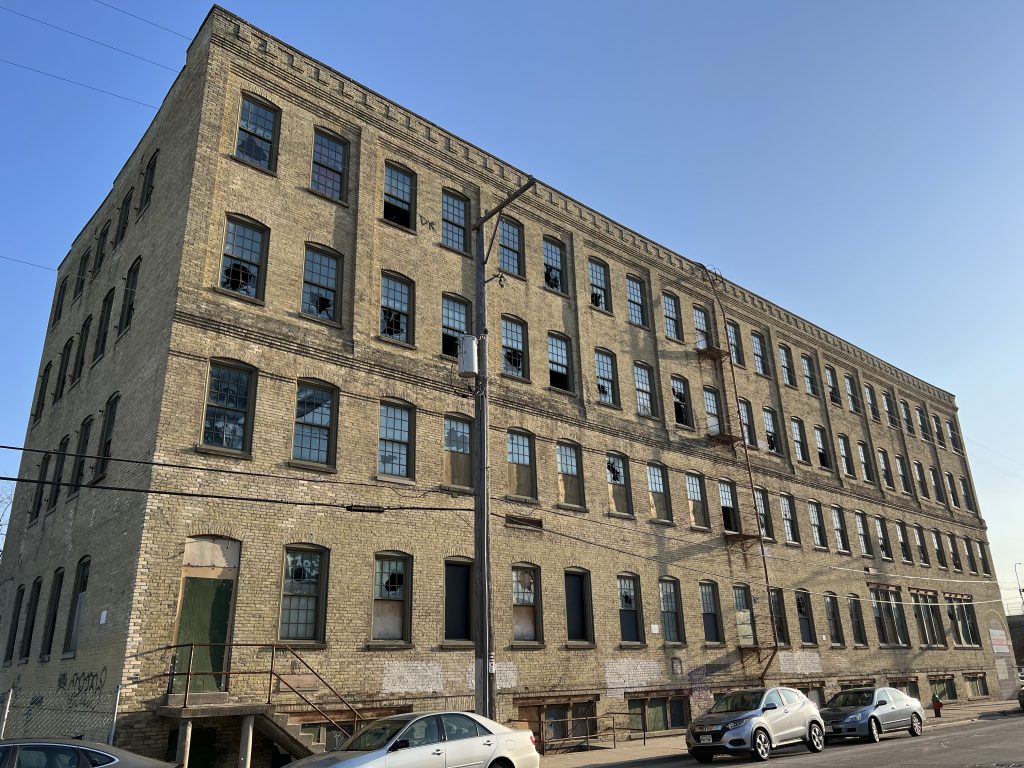
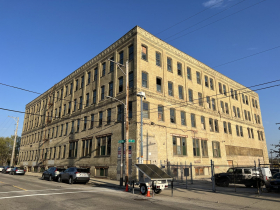
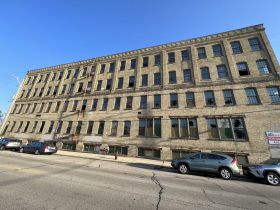
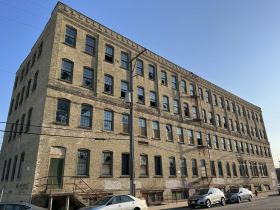
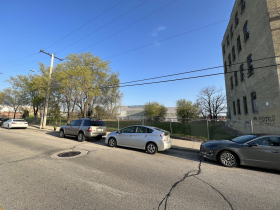



















Smart move. And, yes, it is important to notify new residents of the industrial nature of the area. Whatever the rental equivalent to “caveat emptor,” is, it applies. You don’t get to move into an area like this and suddenly have complaints that it’s industrial noises, sights, and smells.bother you.